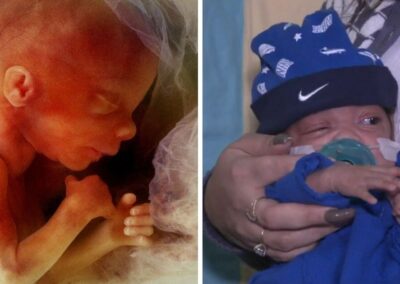A baby boy who spent an incredible 134 days in hospital after being born weighing only 1lb 1oz when he was born at only 22 weeks gestation has finally gone home.
Baby Aaron was born when his mother, Thelma Hernandez, was only 22 weeks pregnant, and had to be sent straight to the Neonatal Intensive Care Unit (NICU). Even though the odds were against him, over 19 weeks later, the family received the good news that Aaron was finally able to go home.
“I was like, in shock”, Thelma said. “For a few days I couldn’t believe it”.
After such a long time in the NICU, which Thelma described as “really hard”, she expected baby Aaron to have to come home with oxygen and a feeding tube, as he was intubated and unable to eat. Fortunately, this was not the case.
“He’s really strong”, she said. “It is a really big achievement to bring him home after all these months”.
Once Aaron was home, the family wanted to spend as much time with him as possible. “We just stayed with him all day. I couldn’t believe I had him here”, Thelma said about baby Aaron’s first day at home. She held him for three to four hours in the morning, and then another four hours in the afternoon, as nurses told her that this contact with her baby would help him feel better.
Nurses treated baby Aaron like he was their “family”
Thelma has expressed her gratitude to the team that cared for Aaron in the NICU, saying that some of them “even changed their shifts just to be there when he needed surgery”.
The children’s hospital threw a graduation-themed party for Aaron when it was time to leave the NICU, giving him a little cap and gown to be photographed in. Some nurses who were not working that day even came to celebrate baby Aaron leaving the NICU, with Thelma saying that they treated him “like if it was their family”.
Improved survival rates for extremely premature babies
The survival rates for extremely premature babies like Aaron have significantly improved in recent decades. A 2008 study looking at survival rates for a neonatal intensive care unit in London found that neonatal survival rates at 22 and 23 weeks gestation had improved over time. In 1981-85, no babies who were born at these gestational ages survived to discharge. However, by 1986-90, 19% did and this increased to 54% in the period 1996-2000.
In the decade to 2019 alone, the survival rate for extremely premature babies born at 23 weeks doubled, prompting new guidance from the British Association of Perinatal Medicine (BAPM) that enables doctors to intervene to save premature babies from 22 weeks gestation. The previous clinical guidance, drafted in 2008, set the standard that babies who were born before 23 weeks gestation should not be resuscitated.
Spokesperson for Right To Life UK, Catherine Robinson, said “It is wonderful to hear this heartwarming story of how baby Aaron is such a fighter and made it home after nearly five months in the NICU. As the likelihood of survival for babies like Aaron, who were born below the current UK abortion limit, increases, this poses a direct challenge to the abortion law in Britain, which permits abortion up to the 24th week of pregnancy”.












